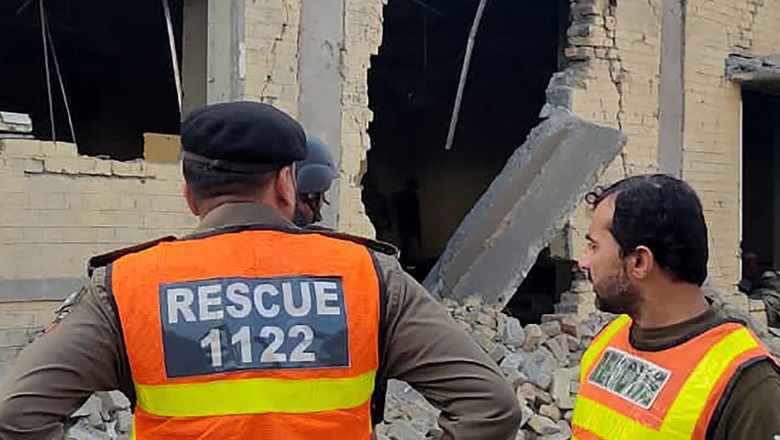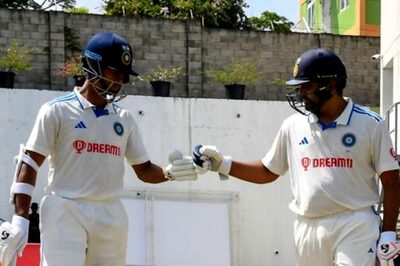
views
Iran launched an unprecedented missile and drone attacks on terrorist bases of a Sunni militant group in the Balochistan province of Pakistan, killing two children and injuring three others.
Iranian news agency Mehrnews said the “missile and drone response” targeted the Jaish al-Adl group’s headquarters in Pakistan, calling it “another decisive step taken by Iran in response to the aggression against the security of our country”. Two bases of Balochi militant group Jaish al Adl were targeted by missiles in the attack.
The attacks led to severe criticism from Islamabad with the latter issuing a strongly-worded condemnation of Iran’s “violation of its airspace. Iran’s attack on Pakistan came less than a day after Iranian strikes on northern Iraq that killed several civilians.
Why Iran Launched Attacks in Pakistan?
The attack comes a month after at least 11 Iranian police officers were killed in an overnight strike on a police station in the southeastern province of Sistan-Balochistan in December.
Iranian Interior Minister Ahmad Vahidi blamed the attack on the Jaish al-Adl, which operates from Pakistan, for the incident. He claimed the Jaish militants had entered Sistan from the Pakistan side near Panjgur. It is suspected that the bases were in Panjgur in Balochistan province.
Jaish al-Adl, which seeks an independent Baluchistan and has spread across Afghanistan, Iran and Pakistan, acknowledged the latest assault in a statement shared online.
Iran’s attack could potentially raise tensions in the Middle East, already roiled by Israel’s war on Hamas in the Gaza Strip.
What is Jaish al-Adl?
Jaish al-Adl, that translates into “Army of Justice”, was founded in 2012, and is believed to largely operate in Pakistan. It is the “most active and influential” Sunni militant group operating in Sistan-Baluchestan, according to the Office of the US Director of National Intelligence.
The group is among the several Sunni separatist groups claiming to fight for the independence of the Sistan and Baluchestan province in the southeastern corner of Iran, bordering Pakistan’s Balochistan province.
According to the US counter terrorist website, the group was formerly called as Jundallah, and was founded by former leader Abdolmalek Rigi in 2002 or 2003. Rigi served as its leader until the Iranian Government captured and executed him in 2010. After his execution, the group changed its name to Jaysh al-Adl in 2012.
Jaish al-Adl is blacklisted by Iran as a terrorist group and has carried out several attacks on Iranian soil in recent years. The United States has also labelled Jaish al-Adl a terrorist organisation, saying the group “primarily targets Iranian security personnel” but also government officials and civilians with assassinations, kidnappings, and suicide bombings.
In December, suspected Jaish al-Adl members killed 11 people and wounded eight others in a nighttime attack on a police station in southeastern Iran. Another recent attack killed another police officer in the area.
In 2019, Jaish al-Adl claimed responsibility for a suicide bombing targeting a bus that killed 27 members of Iran’s paramilitary Revolutionary Guard.
Iran’s Distrust of Pakistan
There were no details shared with Pakistan by Iran prior to the strike, according to reports. A senior Pakistani security official told the Associated Press that Iran had shared no information prior to the strike. He said Pakistan reserved the right to respond at a time and place of the country’s choosing and such a strike would be measured and in line with public expectations.
Tehran and Islamabad frequently accuse each other of allowing militants to operate from the other’s territory to launch attacks, but it is rare that official forces on either side engage.
Iran has suspected that Sunni-majority Pakistan is hosting insurgents, possibly at the behest of its regional arch-rival Saudi Arabia. However, Iran and Saudi Arabia reached a Chinese-mediated détente last March, easing tensions. Pakistan, meanwhile, has blamed Iran in the past over militant attacks targeting its security forces.
Iran has fought in border areas against militants, but a missile-and-drone attack on Pakistan is unprecedented.
Pakistan’s Baluchistan province, as well as Iran’s neighboring Sistan and Baluchestan province, have faced a low-level insurgency by Baluch nationalists for more than two decades. They initially wanted a share of provincial resources, but later initiated an insurgency for independence.
On July 23 last year, four Iranian policemen were killed while on patrol near the border in an attack claimed by the Jaish Al Adl.
In May, five Iranian border guards died in clashes with an armed group in Saravan, southeast of Zahedan, the provincial capital of Sistan-Balochistan.




















Comments
0 comment